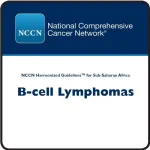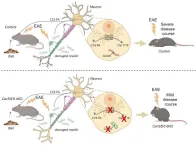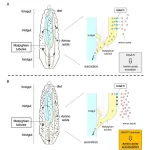(Press-News.org) Accra, GHANA [October 29, 2024] — International oncology experts are gathering in Accra, Ghana for a series of meetings beginning today, to update cancer treatment recommendations in the NCCN Harmonized Guidelines™ for Sub-Saharan Africa. This is the latest event from a longstanding collaboration between the African Cancer Coalition (ACC), American Cancer Society (ACS), and National Comprehensive Cancer Network® (NCCN®), and the Clinton Health Access Initiative (CHAI) that collectively form the group Allied Against Cancer. Together, the organizations are focused on providing context-appropriate, evidence-based cancer care strategies that address the unique challenges faced across the region.
The NCCN Harmonized Guidelines™ for Sub-Saharan Africa are free resources for optimizing and standardizing cancer care across the region. They are available at NCCN.org/harmonized or via the Virtual Library of NCCN Guidelines® App.
“The Sub-Saharan Africa region is dealing with a rising rate of cancer incidences. Standardizing care based on the latest evidence-based expert consensus-driven recommendations helps ensure consistency in treatment and enables better planning for how to use available resources,” said Dr. Henry Ddungu, Senior Consultant, Hematology/Oncology; African Cancer Coalition. “We can ensure people with cancer receive the most effective treatment by harnessing local expertise combined with global best practices.”
During the meeting, the updates to the NCCN Harmonized Guidelines™ for Sub-Saharan Africa will focus on caring for blood malignancies and children’s cancers, including:
Acute Lymphoblastic Leukemia
Acute Myeloid Leukemia
B-cell Lymphomas
Chronic Lymphocytic Leukemia/Small Lymphocytic Lymphoma
Chronic Myeloid Leukemia
Hodgkin Lymphoma
Multiple Myeloma
Pediatric Acute Lymphoblastic Leukemia
Pediatric Aggressive B-Cell Lymphomas
Pediatric Central Nervous System Cancers
Waldenstrom’s Macroglobulinemia/Lymphoplasmacytic Lymphoma
“Since the launch of Allied Against Cancer and publication of the first NCCN Harmonized Guidelines™ for Sub-Saharan Africa in 2017, we have grown to include guidelines covering more than 90% of adult cancer incidences, and most pediatric cancers,” said Anu Agrawal, MD, Vice President, Global Cancer Support, American Cancer Society (ACS). “We are proud of the work we’ve accomplished collaboratively and excited to see continued progress in cancer care across the region.”
“As we strive for health equity across the globe, it is vital that health care providers are equipped with the best tools and resources to deliver optimal care for a variety of different settings,” said Crystal S. Denlinger, MD, Chief Executive Officer, NCCN. “These guidelines are a critical step for helping cancer care professionals stay current on the latest advancements in treatment. They provide a roadmap for ideal options while also taking into account the challenges that exist when delivering care in resource limited settings.”
Dr. Denlinger was joined by NCCN’s Chief Medical Officer, Wui-Jin Koh, MD, along with the following NCCN Clinical Practice Guidelines in Oncology (NCCN Guidelines®) Panel leadership:
Ranjana H. Advani, MD, Stanford Cancer Institute
Jessica K. Altman, MD, Robert H. Lurie Comprehensive Cancer Center of Northwestern University
Hiroto Inaba, MD, PhD, St. Jude Children’s Research Hospital/The University of Tennessee Health Science Center
The NCCN Harmonized Guidelines™ offer color-coded tiers of treatment recommendations based on resource availability. They cover more than 40 different cancer types, plus screening, supportive care, and specific population concerns. They have been utilized nearly 70,000 times since 2017 and have been endorsed by the Federal Ministries of Health and leading cancer centers in Ethiopia, Liberia, Malawi, Nigeria, Tanzania, Uganda, and Zambia.
Learn more about Allied Against Cancer’s collaborative work to improve cancer care in Sub-Saharan Africa at alliedagainstcancer.org. Visit NCCN.org/global for other free international cancer prevention and treatment resources.
# # #
About the National Comprehensive Cancer Network
The National Comprehensive Cancer Network® (NCCN®) is a not-for-profit alliance of leading cancer centers devoted to patient care, research, and education. NCCN is dedicated to improving and facilitating quality, effective, equitable, and accessible cancer care so all patients can live better lives. The NCCN Clinical Practice Guidelines in Oncology (NCCN Guidelines®) provide transparent, evidence-based, expert consensus recommendations for cancer treatment, prevention, and supportive services; they are the recognized standard for clinical direction and policy in cancer management and the most thorough and frequently-updated clinical practice guidelines available in any area of medicine. The NCCN Guidelines for Patients® provide expert cancer treatment information to inform and empower patients and caregivers, through support from the NCCN Foundation®. NCCN also advances continuing education, global initiatives, policy, and research collaboration and publication in oncology. Visit NCCN.org for more information.
END
Cratons are fascinating yet enigmatic geological formations. Known to be relatively stable portions of the Earth’s continental crust, cratons have remained largely unchanged for billions of years. Although cratons have survived many geological events, some are undergoing decratonization—a process characterized by their deformation and eventual destruction. For example, the North China Craton (NCC), an ancient continental crust block, is known to have begun extensive decratonization during the Mesozoic era, largely due to tectonic and geochemical modifications and destabilization of its base (or ‘keel’). However, explaining the mechanisms ...
Despite ongoing efforts to curb CO2 emissions with electric and hybrid vehicles, other forms of transportation remain significant contributors of greenhouse gases. To address this issue, old technologies are being revamped to make them greener, such as the reintroduction of sailing vessels in shipping and new uses for hydrogen in aviation. Now, researchers reporting in ACS Sustainable Chemistry & Engineering have used computer modeling to study the feasibility and challenges of hydrogen-powered aviation.
“While there is a long way to go for hydrogen aviation to be realized at scale, we hope that our ...
Socioeconomic factors such as education, occupation, and wealth influence the likelihood of developing cognitive impairment or dementia in later life and whether a person is likely to recover, finds a new study led by UCL researchers.
The research, published in Scientific Reports, followed 8,442 adults aged 50 and above in England over 10 years from 2008/09 to 2018/19, to examine how socioeconomic factors at the start of the study were associated with changes in cognitive status.
The researchers tracked how these people moved between various states: healthy, mild cognitive impairment, and dementia. They also considered the possibility ...
Getting to the heart of causality is central to understanding the world around us. What causes one variable — be it a biological species, a voting region, a company stock, or a local climate — to shift from one state to another can inform how we might shape that variable in the future.
But tracing an effect to its root cause can quickly become intractable in real-world systems, where many variables can converge, confound, and cloud over any causal links.
Now, a team of MIT engineers hopes to provide some clarity in the pursuit of causality. They developed ...
About The Study: This article discusses a recent revision of the Alzheimer Association criteria to define Alzheimer disease (AD) as a purely biological entity, which raises concerns that if diagnosis of AD can be reduced to the sole presence of AD core 1 biomarkers, major uncertainty and variability in the clinical prognosis of patients diagnosed with AD may be introduced.
Corresponding Author: To contact the corresponding author, Bruno Dubois, MD, MSc, email bruno.dubois@aphp.fr.
To access the embargoed study: Visit our For The Media website at this link https://media.jamanetwork.com/
(doi:10.1001/jamaneurol.2024.3770)
Editor’s ...
The EULAR 2025 Congress will gather the world's foremost rheumatology experts, fostering a unique environment to explore pioneering research, clinical advancements, and patient-centred innovations in rheumatology. This annual flagship event offers unparalleled access to transformative discussions and showcases the latest strides in patient care for rheumatic and musculoskeletal diseases (RMDs).
This year's Congress programme promises an impressive line-up, featuring must-see scientific sessions, EULAR Recommendations, and insightful abstract presentations. Esteemed speakers from across Europe and beyond ...
NEW YORK, November 1, 2024 — Newly published research in the journal Glia has identified crucial links between dietary choices and the progression of multiple sclerosis (MS). The study, led by Patrizia Casaccia, founding director of the Advanced Science Research Center at the CUNY Graduate Center’s (CUNY ASRC) Neuroscience Initiative and Einstein Professor of Biology and Biochemistry at the CUNY Graduate Center, explored how enzymes called ceramide synthase 5 and 6 are responsible for the toxic effect ...
With the rapid increase in the global population, a "protein crisis" is expected in the near future, where the supply of protein will not be able to meet the rising demand. Fishmeal is the most common protein source that supports the production of livestock and aquaculture products, which are key protein sources for human consumption. However, global shortage of fishmeal and its rising prices have created an urgent need to find and secure an alternative protein source. Insects are gaining attention as novel protein sources ...
Most women use medication during pregnancy. Yet, selecting appropriate drugs and doses is challenging. In a new The Lancet article, physicians and researchers from the Radboud university medical center, Maastricht UMC+, Imperial College London, and the University of Liverpool introduce a shared decision-making approach combining ethical principles and a pregnant woman’s values with existing evidence. They use the example of sertraline, a commonly prescribed antidepressant in pregnancy, to illustrate the advocated decision-making process.
Although pregnant women often need medication, data on drug safety and efficacy in pregnancy remains limited. Historically seen as vulnerable research ...
Summary:
Texas Tech’s Natasja van Gestel has been named Station Science Leader by the National Science Foundation (NSF), enabling her to lead and coordinate research at Antarctica’s Palmer Station while advancing her work on climate change’s impact on glaciers. As a leader, she will oversee multiple scientific initiatives, manage resources and ensure compliance with the Antarctic Treaty’s regulations.
Why This Matters:
Climate Study: Her research contributes vital data on climate change effects in Antarctica, crucial for global climate assessments.
International Collaboration: ...



